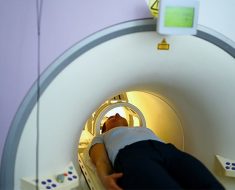It’s getting to that point in the year where we basically turn into creatures of the night.
And that’s not just because party season is starting to ramp up, it’s also because the sun is just refusing to make an appearance.
We’re getting up for work in the dark, commuting in the dark, staying inside all day to hide from the cold, and by the time we leave the office for the day, yep, it’s dark again.
This bleak weather is perfect for spooky season, and it’s great for hibernating and binging box sets – but what is this complete lack of sunlight doing to our bodies?
A new study has found that almost half of London office workers only receive up to 30 minutes of sunlight a day during the winter, and two‐thirds estimated they receive less than an hour of sunlight a day
The detrimental effects of too much sun is well-documented. We all know that we need to cover up in summer and wear SPF to protect against cancer, premature aging and harmful free-radicals.
But too little sun – less is known about that. Essentially it comes down to vitamin D.
‘A lack of sun exposure on a long-term basis can have detrimental effects our bodies, which is why ensuring you get enough vitamin D is crucial, even if this is in supplement form,’ says Dr Clare Morrison, GP and medical advisor at Medexpress.
‘A lack of sunlight can cause a multitude of problems such as weak bones, foot deformities, some cancers, depression, skin problems, weight gain and cognitive issues.
‘In short, a lack of vitamin D not only affects you physically but also mentally, without enough sun exposure, your serotonin levels can dip and low levels of serotonin are associated with a higher risk of major depression and SAD.’
Dr Morrison says D3 is the most effective and important form of the vitamin, and the best way to get it in your diet is through oily fish such as mackerel and salmon, fish oil, eggs, liver and butter.
‘In addition, the body makes its own D3 when the skin is exposed to direct sunlight,’ she adds. ‘In a pretty sun-starved nation, getting our vitamin D fix from the sun, especially in the long drawn out winter can be tough, so sourcing the most active and usable form of vitamin D from our food is imperative.
Source: Read Full Article





